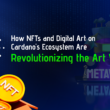Genius DEX is a Decentralized Exchange of concentrated liquidity, developed for execution with eUTxO smart contracts, which have the characteristics of security, determinism, parallelism, scalability and composability.
These characteristics of the eUTxO model are summarized in the concurrency, which you can read in my article, at the end (1).
Genius is the first DeFi platform to combine a concentrated DEX with a liquidity management system.protocols DEX and Yield Optimizer have been designed to fully benefit from Cardano’s eUTxO-based ledger.
The innovation brought by the eUTxO system allows Turing to complete smart contracts, absent in Bitcoin’s original UTxO model, and which differ substantially from the account model-based protocols, such as in Ethereum, that currently dominate the DApp space. At the end you have a link to an article of mine on this subject (2).
A complete Turing system is one that has computational power equivalent to the universal Turing machine, that is, the system and the universal Turing machine can emulate each other, and thus obtain autonomy.
Genius DEX offers powerful features such as:
- Smart Swaps, which enable programmable and composable orders, and Concentrated Liquidity Positions, which provide greater capital efficiency and higher return opportunities, and
- Smart Liquidity Vault, which features a powerful secondary protocol built on top of Genius DEX, which provides yield optimization opportunities from AI-driven algorithmic trading strategies, a DeFi yield optimization solution that algorithmically automates trading strategies, to maximize users’ APYs (Annual Percentage Yield) and minimize risk exposure. The auto-compensation feature automatically reinvests profits generated by the Smart Liquidity Vault, providing users with even greater returns without having to exit their position.
Genius DEX is a complete redesign of the typical Automated Market Maker (AMM) DEX protocol. It is a new generation of DEX that takes advantage of the benefits of the eUTxO architecture, such as security, determinism, parallelism, scalability, and composability.
Automated Market Maker (AMM)
The first AMM-based DEX was implemented by Uniswap on the Ethereum blockchain. It is a protocol that incorporates an autonomous trading mechanism, and is based on a mathematical formula to set the price of assets, eliminating the need for an intermediary. These protocols are permissionless, trustless and decentralized. They allow users to act simultaneously as market takers (trading one digital asset for another) and market makers (providing liquidity to a DEX in exchange for trading fees).
There are different pricing formulas, but the most widely used is the Constant Formula Market Maker (CFMM), where the price can be easily calculated no matter how big the order size is or how small the liquidity pool is. Its simplicity and robustness have made this design the most favorable for DEXes. However, they have important limitations since capital allocation is highly inefficient compared to traditional markets. At the same time, your liquidity is subject to impermanent loss, which is the perceived loss in total asset value from liquidity deposited in a pool, compared to just holding the assets.
Order book
The order book design is rarely used in DEX, (Muesliswap on Cardano), is the architecture of the big exchanges in traditional finance, for example, Robinhood and Coinbase. It is structured in a book of buy orders (offers) and sell orders (demands), where it seeks to match each price point, and the market makers help stabilize the price by completing the orders, adjusting the spread between supply and demand. Price is not a global state (as in an MMA), but rather an emergent dynamic property of the order book, which allows for an arbitrary liquidity curve rather than a deterministic one. They do not suffer impermanent loss because there are no liquidity pools.
AMM-based protocols have been easier to implement than Order Book-based, on account-based blockchains to mitigate transaction costs, settlement speeds, and complexity.
eUTxO-based DEX
AMM DEXes grew out of the account model-based mindset, spearheaded by Ethereum. On Cardano, DEXes will be fundamentally different, as they will need to take an eUTxO-first approach to succeed, where state sharding and parallel processing are core ledger features and, coincidentally, a natural design pattern for ledgers. orders.
Users should use a Cardano Shelley-Era wallet :
- Daedalus Mainnet 4.1.0. (desktop, hardware wallet supported)
- Yoroi mobile (iOS & Android, no hardware wallet)
- Yoroi browser extension (desktop, hardware wallet supported)
- Adalite-Ledger (desktop, hardware wallet)
- Adalite-Mnemonics (desktop)
- Typhon Wallet (Browser extension, hardware wallet supported)
- Eternl wallet formerly ccvault.io (Browser extension, hardware wallet supported)
What is Yield Optimizer?
Yield Optimizer is a tool used to generate the best possible yield in the DeFi ecosystem, where different protocols cannot maintain a stable APY.
The good thing about volatility is that it offers a unique opportunity for users to quickly switch between different protocols and reap the benefits of higher performance, but the bad thing is that it is only useful for a few skilled, non-risk-averse people.
Yield Optimizer allows users to get the best possible APY, using complex algorithms from AI-driven trading strategies, and automatically staking user funds across different protocols, replacing the manual process of depositing, withdrawing, and exchanging tokens across multiple protocols. protocols and between multiple liquidity pools the Cardano blockchain.
Concentrated Liquidity
Concentrated Liquidity allows Liquidity Providers (LPs) to allocate their capital to a DEX at selected price ranges. It is in contrast to regular liquidity pools, where the liquidity is spread evenly across the price range. As mentioned, the AMM protocol results in high capital inefficiencies and impermanent loss. Concentrated liquidity pools try to remedy the limitations of AMM.
Instead of a fixed liquidity curve defined by the CFMM formula, it allows market sentiment to decide the distribution of liquidity in a decentralized way.
Liquidity Providers (LPs) can create as many liquidity positions as they see fit. However, while more flexible than static (traditional, such as Uniswap) AMMs, a Concentrated Liquidity AMM is still not as flexible and efficient as an Order Book DEX.
A disadvantage of concentrated liquidity pools is that they require active and frequent manual “rebalancing” of an LP’s position to stay within the optimal price range and maximize rewards. For blockchains with high transaction fees, e.g. Ethereum, frequent rebalancing may not even be cheap, as rewards are canceled out by the fees paid for liquidity rebalancing. However, unless you are a day trader with technical knowledge of the market, inefficient liquidity allocation can still occur in a pool of concentrated liquidity.
For these reasons, Genius Yield believes there is a need to empower a Concentrated Liquidity DEX, by overlaying a secondary protocol, that can algorithmically automate asset allocation to maximize user APYs and minimize risk exposure. Genius Yield Smart Liquidity Management will be an AI-powered protocol capable of executing various trading strategies based on the user’s pre-defined risk tolerance, expected returns and time frame.
Tokenomics and Governance
The $GENS token is a native Cardano token, as there is no need to create smart contracts to handle custom tokens, as the ledger takes over all functionality, and allows for the transaction of multiple assets on Cardano.
Users can transact with ADA, and with an unlimited number of user-defined (custom) tokens natively.
$GENS are the native tokens of the Genius Performance Protocol. These tokens can be used to open a Genius Yield account and start earning optimized returns.
$GENS will be available on all major exchanges. The $GENS also acts as a governance token, and anyone who owns $GENS is a party to making platform updates decisions, they will be able to create proposals and vote on them by delegating or holding $GENS.
20% of platform transaction fees will be distributed among $GENS holders as a reward.
Sales information:
- Seed Sale Ends: November 1, 2021
- ISPO Launch: December 15, 2021
- ISPO Ends: May 10th, 2022
- Public Pre-Sale: TBC
- Total Token Supply: 100,000,000
- Tokens Allocated Public Pre-Sale: 3,000,000
- Tokens Allocated (ISPO): 15,000,000
KYC and Whitelisting
Due to Swiss law, all people participating in the public sale must complete the KYC process. Know Your Customer (KYC) are a set of standards used within the investment and financial services industry to verify customers. To be whitelisted for the public sale, you’ll need to confirm your bonus rewards eligibility and complete the KYC process.
We are sorry to have to inform you that due to legal reasons, investors from the following countries cannot participate in the GENS Public Sale Rounds. With advice from our legal team and partners, we decided not to include the following countries because of regulatory reasons: Albania, Barbados, Burkina Faso, Cambodia, Cayman Islands, Democratic People’s Republic of Korea (DPRK), Haiti, Iran, Jamaica, Jordan , Mali, Malta, Morocco, Myanmar, Nicaragua, Pakistan, Panama, Philippines, Senegal, Republic of South Sudan, Syria, Turkey, Uganda, United Arab Emirates, Yemen, Russia, Belarus, and the USA.
What is an ISPO?
An ISPO is a fundraising mechanism that allows delegators of a POS (Proof-of-Stake) network to direct delegation rewards from a blockchain consensus stakepool to a project and earn project tokens in return. .
The ISPO has concluded and this was its agenda:
So What’s Next? The Genius X ISPO!
The Roadmap
The Team
The team, Genius Labs, is made up of well-known members of the community. Its co-founders are Laurent Bellandi, Dr. Sothy Kol-Men and Remy Baldo. The participation of Dr. Lars Brünjes stands, as Chief Technology Officer (CTO), who is Education Director of IOHK.
You can see all its members here.
Genius X
Genius X is another development of Genius Labs, a business acceleration program that fosters innovation on the Cardano network and Web3, enabling protocols to build scalable blockchain-based businesses, through the Pre-Seed Accelerator, a program Genius X Core Accelerator.
…
(1) Concurrency in the eUTxO model is not a problem but a challenge
(2) Accounting Models in Blockchain: UTxO, eUTxO and Account Models










